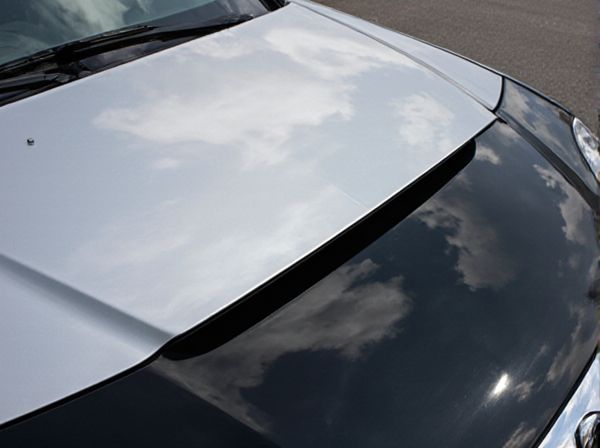
Photo illustration: Steel Hood vs Aluminum Hood
Steel hoods offer superior strength and durability, providing better protection in collisions and increased resistance to dings and dents. Aluminum hoods are lighter, improving your vehicle's fuel efficiency and handling while still offering sufficient corrosion resistance. Choosing between them depends on your priorities for performance and longevity.
Table of Comparison
| Feature | Steel Hood | Aluminum Hood |
|---|---|---|
| Weight | Heavier, adds more weight to the vehicle | Lighter, reduces overall vehicle weight |
| Durability | Highly durable, resists dents easily | Less durable, dents more easily |
| Corrosion Resistance | Prone to rust without proper coating | Resistant to rust and corrosion |
| Cost | Generally less expensive | Higher upfront cost |
| Repair | Easier and cheaper to repair | More complex and costly repairs |
| Fuel Efficiency Impact | Heavier weight can reduce fuel efficiency | Lighter weight can improve fuel economy |
Overview: Steel Hood vs Aluminum Hood
Steel hoods offer superior strength, durability, and resistance to dents, making them ideal for heavy-duty use and impact protection. Aluminum hoods provide lightweight advantages, enhanced corrosion resistance, and improved fuel efficiency due to reduced vehicle weight. The choice between steel and aluminum hoods depends on priorities such as cost, weight savings, and performance requirements in automotive applications.
Weight and Performance Differences
Steel hoods are significantly heavier than aluminum hoods, with steel weighing approximately 40-50% more, which can affect overall vehicle weight and fuel efficiency. Aluminum hoods offer superior weight reduction, enhancing acceleration and handling due to decreased front-end mass. Performance-wise, steel provides increased durability and impact resistance, while aluminum hoods excel in heat dissipation and corrosion resistance, influencing long-term vehicle maintenance and performance.
Durability and Longevity
Steel hoods offer superior durability due to their high tensile strength and resistance to dents and impacts compared to aluminum hoods. Aluminum hoods provide better corrosion resistance and are less prone to rust, contributing to longer lifespan in humid or salty environments. Steel typically has a longer service life in terms of structural integrity, while aluminum hoods require less maintenance to preserve their appearance over time.
Cost Comparison
Steel hoods generally cost less than aluminum hoods due to the lower price of raw steel and simpler manufacturing processes. Aluminum hoods, while more expensive upfront, offer benefits such as lighter weight and corrosion resistance that may reduce long-term maintenance expenses. When comparing initial investment and durability, steel remains the more budget-friendly option for cost-conscious buyers.
Corrosion Resistance
Aluminum hoods offer superior corrosion resistance compared to steel hoods due to their natural oxide layer that prevents rust formation, making them ideal for humid or coastal environments. Steel hoods, even when coated or painted, are more susceptible to rust and corrosion over time, especially if the protective layer is damaged. Selecting aluminum hood ensures longer durability and reduced maintenance costs in corrosive conditions.
Repair and Maintenance
Steel hoods offer superior durability and are easier to weld and repair after impacts, making them cost-effective for long-term maintenance. Aluminum hoods, while lightweight and resistant to rust, often require specialized repair techniques such as filler materials or panel replacements, increasing repair costs. Regular maintenance of steel hoods involves rust prevention treatments, whereas aluminum hoods benefit from dent removal and oxidation protection to maintain their appearance and structural integrity.
Safety and Crash Performance
Steel hoods offer superior crash performance due to their higher tensile strength and energy absorption capacity, which enhances occupant protection during frontal impacts. Aluminum hoods are lighter but may deform more easily under crash forces, potentially compromising safety by transferring more energy to the cabin. Choosing steel improves structural integrity and crashworthiness, making it a safer option in collision scenarios.
Aesthetics and Design Flexibility
Steel hoods offer a classic, sturdy appearance with a smooth finish that easily blends into traditional vehicle designs, while aluminum hoods provide a sleek, modern look that appeals to contemporary aesthetics. Aluminum's lightweight properties enable more intricate shapes and design flexibility, allowing designers to create complex curves and aerodynamic features that are harder to achieve with steel. The ability to mold aluminum into unique forms without compromising structural integrity makes it a preferred choice for customized and performance-oriented vehicles.
Environmental Impact
Steel hoods typically have a higher carbon footprint due to energy-intensive production processes and mining activities, but they offer greater recyclability and durability, which can reduce environmental impact over time. Aluminum hoods are lighter, leading to improved fuel efficiency and lower emissions during vehicle use, yet aluminum extraction and refining consume significant energy and resources, contributing to environmental degradation. Choosing between steel and aluminum hoods involves balancing production emissions, recyclability, weight-related fuel savings, and lifecycle environmental costs.
Choosing the Right Hood for Your Vehicle
Steel hoods offer superior strength and impact resistance, making them ideal for vehicles requiring enhanced durability and protection. Aluminum hoods provide a lightweight alternative that improves fuel efficiency and vehicle handling without compromising corrosion resistance. Choosing the right hood depends on balancing factors like weight, durability, cost, and specific vehicle performance needs.
 caratoz.com
caratoz.com